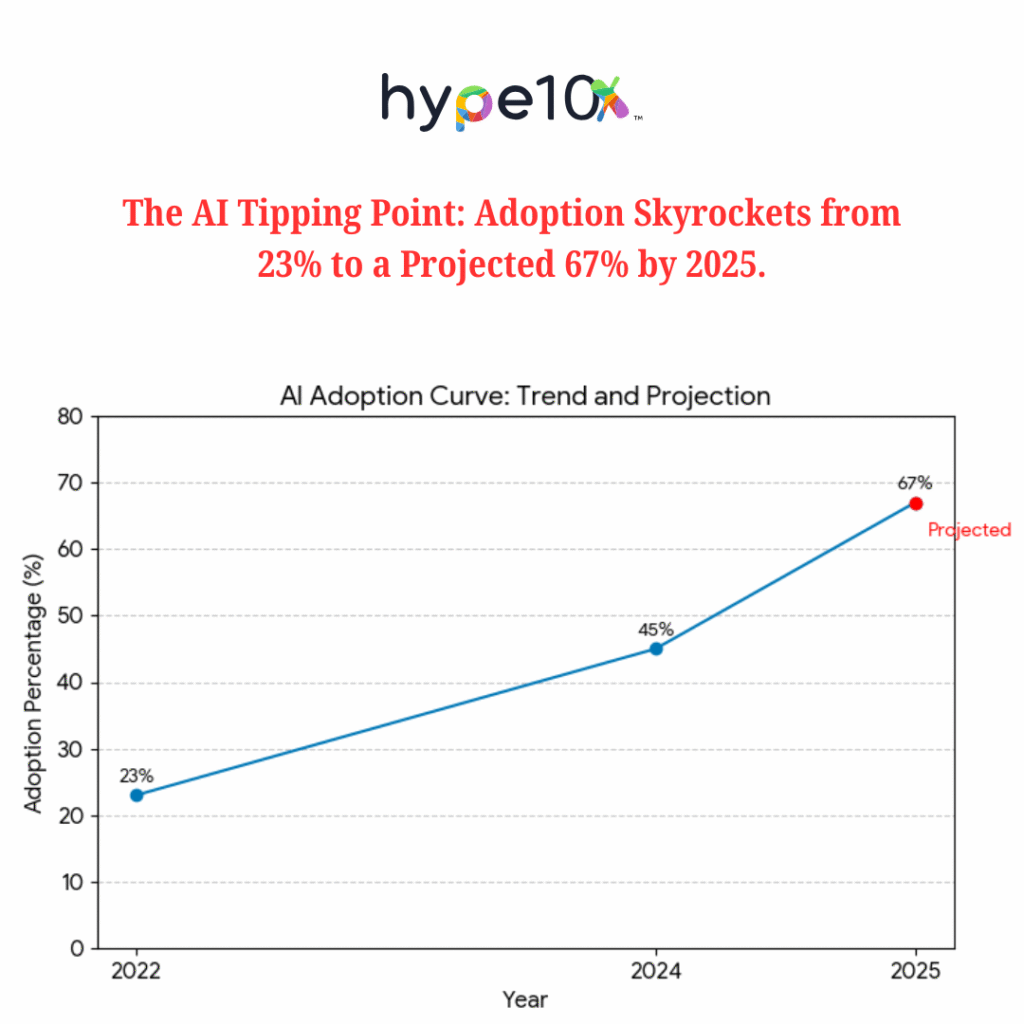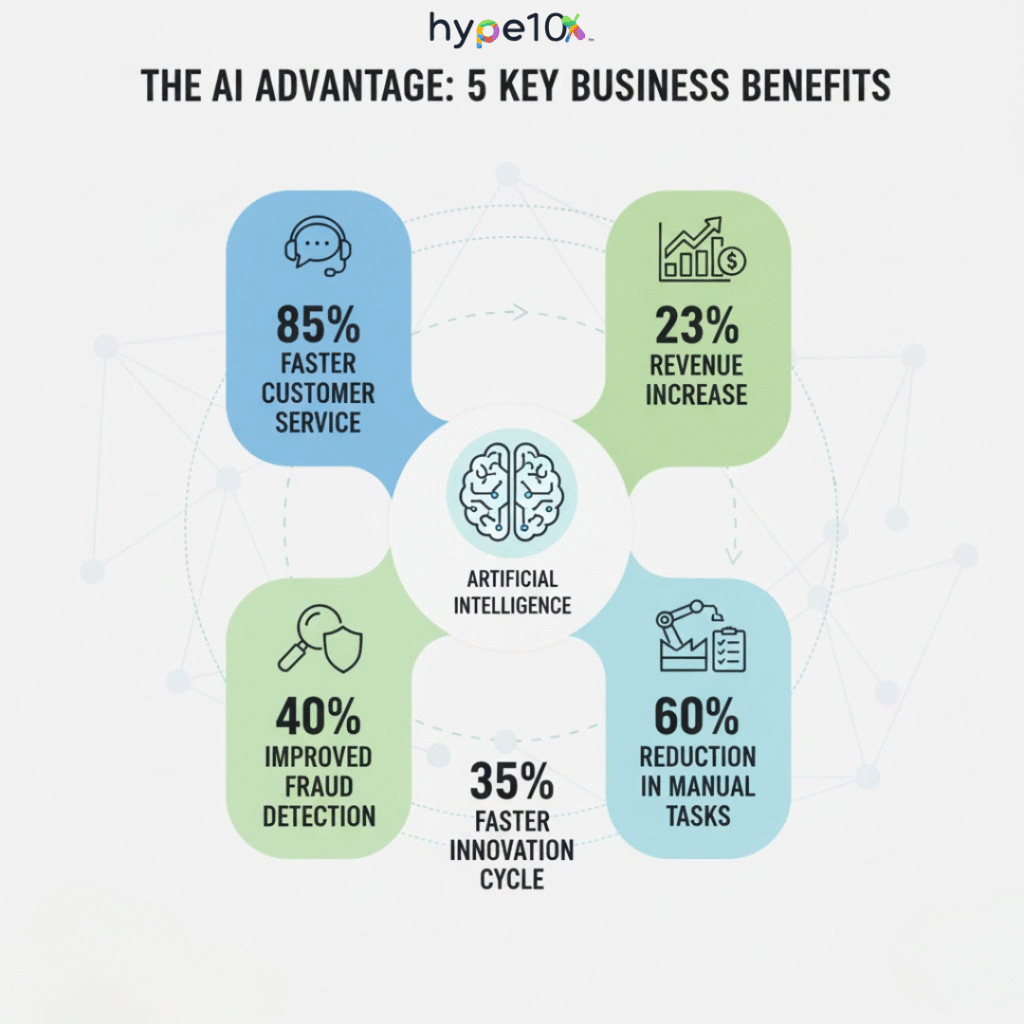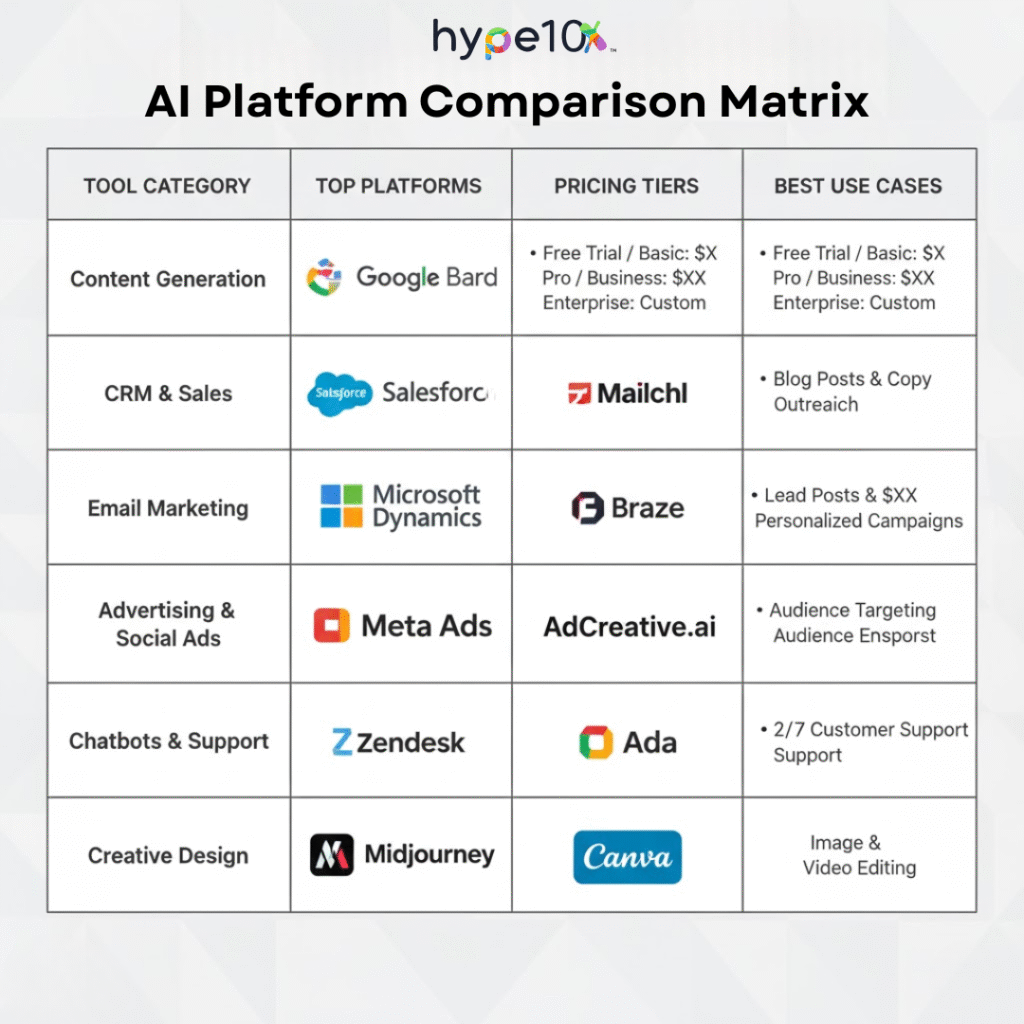Why AI is Transforming E-Commerce
E-commerce is currently undergoing a massive transformation as artificial intelligence evolves from being an essential competitive advantage into an operational necessity. By 2025, AI had expanded beyond chatbots and product recommendations into becoming essential tools that help online retailers understand customers, manage inventory effectively, and drive sales.
Recent data demonstrates that businesses implementing AI solutions are reaping striking improvements: conversion rates have seen dramatic jumps of up to 30%, customer service costs have dropped 40% and personalization capabilities are reaching unprecedented heights of sophistication. These results do not simply represent marginal improvements but represent fundamental shifts in how digital commerce functions.
What is driving this change? A convergence of several factors, including exponentially more powerful machine learning models, vast amounts of consumer data and AI tools increasingly accessible to businesses of all sizes; even small retailers can now deploy AI capabilities once only accessible to tech giants two years ago.
AI adoption by e-commerce businesses is increasingly key for customer satisfaction, operational efficiency and profitability; those that don’t risk becoming obsolete in an ever-more automated marketplace. This is more than chasing trends; AI will determine survival and growth in digital economy’s next chapter.

Key Benefits of Using AI in Your Online Store
Implementing artificial intelligence in your e-commerce business offers tangible advantages that directly benefit the bottom line. Here’s what to expect:
Hyper-Personalized Customer Experiences
AI analyzes browsing behavior, purchase history, and preferences in real time to provide custom shopping journeys tailored specifically for each customer – increasing engagement and purchase likelihood while driving customer engagement and growth.
AI-powered assistants provide 24/7 Intelligent Customer Support, instantly responding to common inquiries while routing complex cases to human agents when necessary, drastically cutting response times from hours down to seconds while significantly decreasing support costs.
Smarter Inventory and Pricing
Predictive algorithms forecast demand with remarkable accuracy, avoiding stockouts and overstock situations. Dynamic pricing adjusts automatically based on competition, inventory levels, demand fluctuations and more to maximize revenues with each transaction.
Fraud Detection and Security
Machine learning systems quickly recognize suspicious patterns and fraudulent transactions to protect both your business and customers while decreasing false declines that impact legitimate sales.
Operational Efficiency
Artificial intelligence has the ability to automate repetitive tasks, freeing your team up to focus on more strategic initiatives rather than manual processes.

Top AI Tools for Marketing and Sales
AI tools can dramatically enhance marketing effectiveness and sales performance. Here are the platforms leading the e-commerce revolution in 2025:
1.Jasper AI and Copy.ai: Content generation powerhouses, are adept at producing compelling product descriptions, emails campaigns, ads and social media posts in mere moments – while maintaining brand voice consistency while optimizing variations tailored specifically for specific audiences and platforms. Their integration with SEO tools ensures their content ranks well while simultaneously reaching customers.
2.HubSpot AI and Salesforce Einstein: Two enterprise-grade CRM platforms that use AI throughout customer journeys, now integrate artificial intelligence (AI) to predict which leads are likely to convert, recommend optimal outreach timing, automate emails based on behavior triggers and provide sales teams with real-time coaching during customer interactions.
3.Klaviyo and Braze: These marketing automation platforms use predictive analytics to segment audiences with pinpoint accuracy. They identify optimal times to send abandoned cart emails, anticipate customer lifetime value estimates, and automatically adapt messaging based on engagement patterns – even offering AI-powered product recommendations that have increased email revenue by as much as 40%!
4.Adext AI and Madgicx : These are paid advertising tools that utilize artificial intelligence (AI) to automatically optimize ad spend across platforms. Their tools test countless combinations of creative, audience targeting and budget allocation while making thousands of micro-adjustments daily that human marketers would be incapable of managing – ultimately leading to reduced customer acquisition costs and an increase in return on ad spend.
5.Drift and Intercom: These are AI platforms designed to engage website visitors in real time, qualifying leads, answering inquiries, booking appointments with sales teams, and learning from each interaction to increase conversion rates while collecting valuable customer insights. Their chatbots continually adapt based on every interaction for optimal conversion rate management while gathering invaluable customer intelligence.
6.Canva Magic Studio and Midjourney : are AI-driven creative tools designed to produce professional marketing visuals, product photography variations, social media posts, and content that rival major brands’ own content production capabilities. Both democratize high-quality design enabling small teams to produce content comparable to what major corporations would generate.

AI Tools for Customer Experience and Support
Customer service excellence has become a cornerstone of e-commerce success, and AI tools are making world-class support accessible to companies of every size.
1.Zendesk AI and Freshdesk, two comprehensive support platforms that utilize AI for ticket categorization, agent response suggestions and routine inquiries without human involvement, as well as sentiment analysis to detect frustrated customers and prioritize cases while knowledge base systems learn from every interaction to provide increasingly accurate self-service options.
2.Gorgias and Kustomer, two purpose-built platforms designed for e-commerce, integrate directly with Shopify, WooCommerce, and major marketplaces. Their artificial intelligence utilizes order history, inventory data, shipping details, and shipping status updates to instantly respond to any “Where is my order” queries and offer real-time order status updates. Furthermore, these AI systems can process returns, apply discounts autonomously, modify orders as necessary or handle up to 60% of routine requests without human assistance!
3.Ada and Ultimate.ai are no-code chatbot builders that create engaging conversational experiences for users. Their natural language processing recognizes customer intent even when questions are poorly phrased, seamlessly handing off complex issues to human agents with full conversation context, and Ada reports that customers resolve issues four times faster compared to traditional support channels.
Forethought and DigitalGenius are advanced AI agents that go beyond simply answering customer inquiries; they predict why customers are reaching out and take steps to address issues before customers even realize there’s been a delay in shipping shipments – such as offering tracking updates and compensation before customers even notice any issue!
AI Tools for Inventory, Operations, and Analytics
Behind every successful e-commerce business lies sophisticated operational intelligence—and AI tools are revolutionizing how retailers manage inventory, logistics, and data-driven decision-making.
Inventory Forecasting and Management
Inventory Planner and Stocky These demand forecasting platforms analyze historical sales, seasonality, market trends, and even weather patterns to predict future inventory needs with remarkable precision. They automatically generate purchase orders, optimize safety stock levels, and identify slow-moving products before they become dead inventory. Retailers report inventory holding costs dropping by 25-35% while maintaining higher product availability.
Cin7 and NetSuite AI Enterprise inventory systems that synchronize stock across multiple warehouses, sales channels, and fulfillment centers in real-time. Their AI optimizes warehouse organization, suggesting where to place products for fastest picking and which location should fulfill each order to minimize shipping costs and delivery times.
Logistics and Operations
ShipBob and Deliverr Fulfillment platforms using AI to route orders intelligently, predict shipping delays, and optimize packaging choices. Their algorithms balance speed, cost, and sustainability—automatically selecting the most efficient carrier and service level for each shipment.
Project44 and FourKites Supply chain visibility tools providing real-time tracking and predictive alerts. They warn about potential delays days in advance, allowing proactive customer communication and contingency planning.
Analytics and Business Intelligence
Tableau AI and Power BI with Copilot These analytics platforms transform raw data into actionable insights. Their natural language interfaces let you ask questions like “Which products have declining margins?” and receive instant visualizations and recommendations.
Google Analytics 4 and Amplitude Customer analytics tools using machine learning to identify high-value user segments, predict churn risk, and recommend optimization opportunities. GA4’s predictive metrics forecast which customers are likely to purchase in the next seven days, enabling targeted remarketing.
Glew.io and Daasity E-commerce-specific analytics consolidating data from all sales channels, advertising platforms, and business systems. Their AI surfaces patterns humans would miss—like discovering that customers who buy product A and B together have 3x higher lifetime value.
The operational advantage is undeniable: AI transforms gut-feel decisions into data-driven strategies, turning operational efficiency into competitive advantage.
How to Choose the Right AI Tool for Your Store
Selecting AI tools requires careful thought rather than being seduced by their latest features. Here’s how you can make informed choices that result in tangible return on investment (ROI).
Begin With Your Biggest Pain Points
Before diving in with AI solutions for no other purpose than to alleviate existing business pain points, identify where AI could make a real impactful difference for you and your company. Is customer service overwhelming you? Prioritize AI chatbots; is inventory running out constantly? Focus on inventory forecasting tools; is advertising performance an issue? Invest in marketing optimization tools as solutions.
Consider Your Technical Capabilities
Evaluate honestly: Do you need developers on staff, or no-code solutions like Gorgias and Ada that require no programming expertise to use? Tools like these provide easy plug-and-play implementation while platforms like Salesforce Einstein require technical knowledge for implementation. Choose tools according to their complexity according to what works for your team–an expensive but inaccessible tool won’t help the cause!
Integration Is Key
An AI tool becomes useless if it cannot integrate seamlessly with your current tech stack. Check compatibility with e-commerce platforms, payment processors, email systems and analytics tools; seamless data flow increases AI effectiveness exponentially.
Scalability and Pricing Models Choose tools that scale with you. AI platforms often charge per interaction, transaction or user – costs that can quickly skyrocket as your organization expands. Review pricing tiers carefully and verify that they make sense at 2x, 5x and 10x your current volume.
Most quality AI tools offer free trials or demos that let you explore multiple options with real business scenarios before making long-term commitments.
